- US joins with South Korea, Japan in bid to deter North Korea
- LPGA golfer Chun In-gee finally back in action
- S. Korea won’t be top seed in final World Cup qualification round
- US men’s soccer misses 2nd straight Olympics
- US back on track in qualifying with 4-0 win over Guatemala
- High-intensity workout injuries spawn cottage industry
- CDC expands range of Zika mosquitoes into parts of Northeast
- Who knew? ‘The Walking Dead’ is helping families connect
- California Assembly OKs highest minimum wage in nation
- S. Korea unveils first graphic cigarette warnings
Fukushima release plan finalized as most realistic alternative: S. Korean official
Japan’s decision to release contaminated water from its crippled Fukushima plant was finalized years ago as the most realistic alternative, and there is no point in talking about other ways to dispose of the water now, an official said Monday.
Amid concerns about health hazards, critics have suggested alternative ways, other than releasing the wastewater into the ocean, such as solidifying the water within concrete or storing the water in massive tanks.
“That part is something that was discussed for more than four years in the mid-2010s,” Park Ku-yeon, the first deputy chief of the Office for Government Policy Coordination, said of other methods during a daily briefing on the Fukushima release plan.
“At the time, there were extremely complex discussions within Japan, and the International Atomic Energy Agency (IAEA) was in the final decision,” Park said. “The current method of releasing it into the ocean was finalized as the most realistic alternative when scientific precedents and safety were comprehensively taken into account.”
Suggesting the IAEA reverse the decision would contradict the principles of faith and trust, Park said.
Meanwhile, Tokyo Electric Power Co., the operator of the plant, aims to complete the trial operation of its discharge facility on Tuesday, Park said.
Starting Wednesday, Japan’s Nuclear Regulation Authority, the country’s top nuclear regulator, will begin the trial operation of other dilution and transfer facilities.
In response to heightened public concern, the Seoul government launched a daily press briefing earlier this month to keep the public updated on the release of contaminated water from the plant planned for this summer.












